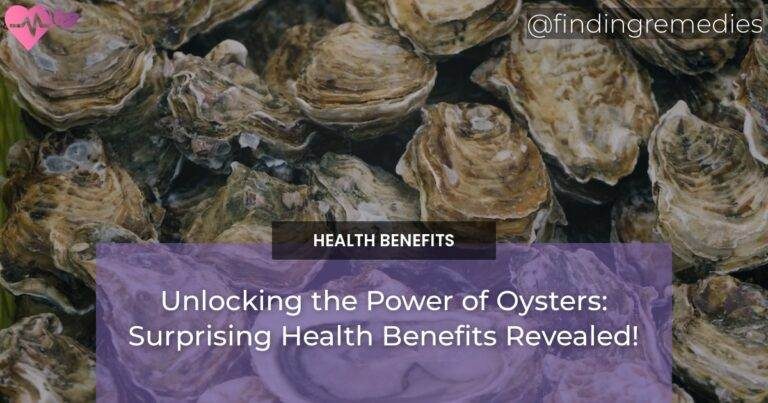Health Benefits of Oysters: Foods as Medicine
Oysters are delicious shellfish that have been enjoyed for centuries. They are also a nutritional powerhouse that can provide numerous health benefits. In this article, we’ll explore the nutritional profile, natural compounds, health benefits, potential disadvantages, and varieties of oysters. By the end, you’ll have a newfound appreciation for this seafood delicacy.
Nutritional Profile of Oysters
Oysters are low in calories and high in nutrients. They are an excellent source of protein, vitamins, and minerals. Here are some of the key components of oysters:
Vitamins and Minerals
- Vitamin B12
- Zinc
- Copper
- Iodine
- Iron
- Selenium
Protein and Amino Acids
Oysters are a complete source of protein, meaning they contain all the essential amino acids your body needs. They are also high in taurine, an amino acid that is important for brain health, mood, and energy.
ALSO READ
Fats and Cholesterol
Oysters are low in fat and cholesterol. In fact, they are one of the few animal-based sources of omega-3 fatty acids, which are important for cardiovascular and brain health.
Natural Compounds in Oysters
In addition to their nutritional value, oysters contain several natural compounds that provide health benefits:
Zinc
Oysters are one of the best sources of zinc, a mineral that is essential for immune system function. Zinc also plays a role in wound healing and cell growth.
ALSO READ
Selenium
Oysters are high in selenium, another mineral that is important for immune system function. Selenium also has antioxidant properties and may reduce the risk of certain types of cancer.
Omega-3 Fatty Acids
Oysters contain a type of omega-3 fatty acid called EPA, which has been shown to reduce inflammation and improve cardiovascular health.
Antioxidants
Oysters contain several antioxidants, including vitamin E, vitamin C, and beta-carotene. Antioxidants help protect your cells from damage caused by free radicals.
Health Benefits of Oysters
With all the nutrients and natural compounds in oysters, it’s no surprise that they offer several health benefits:
Boosting Immune System
As previously mentioned, oysters are rich in zinc and selenium, which are essential for immune system function. Eating oysters regularly may help protect you from illness and infection.
Improving Cardiovascular Health
The omega-3 fatty acids in oysters have been shown to reduce inflammation and improve cardiovascular health. Eating oysters may help lower your risk of heart disease, stroke, and high blood pressure.
Supporting Bone Health
Oysters are a good source of calcium, which is important for bone health. They also contain vitamin D, which helps your body absorb calcium.
Anti-Inflammatory Properties
The natural compounds in oysters, including omega-3 fatty acids and antioxidants, have anti-inflammatory properties. Eating oysters may help reduce inflammation in your body and lower your risk of chronic diseases.
Preventing and Fighting Cancer
The antioxidants and selenium in oysters may help protect against cancer. Some studies have shown that eating oysters may reduce the risk of certain types of cancer, including breast and colorectal cancer.
Effects of Cooking and Proper Storage
Cooking Methods
There are several ways to cook oysters, including grilling, steaming, and frying. It’s important to cook oysters properly to avoid bacterial contamination (more on that later).
Storage and Safety Tips
Oysters should be stored in the refrigerator and eaten within a few days. Raw oysters can be risky to eat because they may contain harmful bacteria, including Vibrio vulnificus and Vibrio parahaemolyticus. To reduce your risk of illness, make sure to only eat oysters that have been properly cooked.
Potential Disadvantages and Risks
Allergies
Some people are allergic to shellfish, including oysters. If you have a shellfish allergy, avoid eating oysters.
Bacterial Contamination
As mentioned earlier, raw oysters can contain harmful bacteria that can cause illness. It’s important to cook oysters properly to reduce your risk of illness.
Heavy Metal Contamination
Oysters can accumulate heavy metals, such as mercury and lead, in their tissues. To reduce your exposure to these contaminants, choose oysters that are harvested from clean waters and limit your consumption.
Varieties and Types of Oysters
There are several varieties of oysters, each with their own unique flavor and texture:
Pacific Oysters
Pacific oysters are the most commonly consumed oyster in the United States. They are known for their mild, slightly sweet flavor.
Eastern Oysters
Eastern oysters are smaller and more briny than Pacific oysters. They are often used in raw preparations, such as oyster shooters and ceviche.
Olympia Oysters
Olympia oysters are the only oyster native to the Pacific Northwest. They are highly prized for their sweet flavor and small size.
Kumamoto Oysters
Kumamoto oysters are a Japanese variety that has become popular in the United States. They are small and sweet with a deep cup.
Are Oysters and Horseradish Both Considered Superfoods for Health Benefits?
Yes, oysters and horseradish are both considered superfoods for their miraculous health benefits. Oysters are packed with zinc and omega-3 fatty acids, while the miraculous health benefits of horseradish include its high levels of antioxidants and anti-inflammatory properties. Both contribute to overall well-being and can be a great addition to a healthy diet.
Conclusion
Oysters are a delicious and nutritious food that offer numerous health benefits. They are high in protein, vitamins, and minerals, and contain natural compounds that have anti-inflammatory and antioxidant properties. By incorporating oysters into your diet, you can boost your immune system, improve your cardiovascular and bone health, and help prevent chronic diseases. Just be sure to cook them properly and choose oysters from clean waters to reduce your risk of illness and exposure to contaminants.
So, go ahead and add oysters to your diet and enjoy all the health benefits they have to offer!

